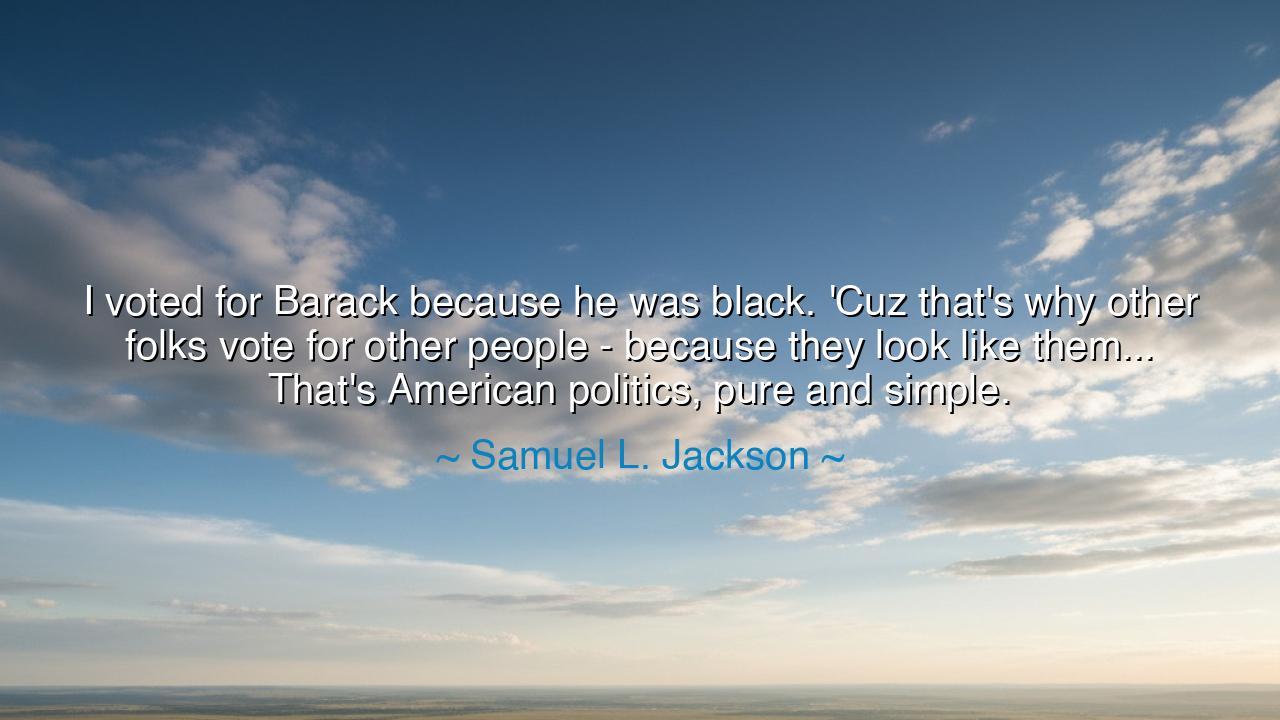
I voted for Barack because he was black. 'Cuz that's why other
I voted for Barack because he was black. 'Cuz that's why other folks vote for other people - because they look like them... That's American politics, pure and simple.






The words of Samuel L. Jackson — “I voted for Barack because he was black… That’s American politics, pure and simple.” — pierce to the heart of how identity shapes power. He speaks with candor, unveiling the truth that in politics, people often choose leaders who reflect their own image, their own struggles, their own hopes. In saying this, he strips away the veil of lofty rhetoric to reveal the primal bond between the governed and those who govern: the bond of likeness.
For centuries, men have voted for men, whites for whites, elites for elites, often without naming it as such. Jackson’s declaration concerning Barack Obama is not an admission of bias, but a recognition that representation matters. When one who has long been excluded at last rises to the high seat of power, the people who share in his identity see themselves lifted up as well. It is not merely one man who wins, but a multitude who find their dignity affirmed.
History itself echoes this truth. Consider the election of Nelson Mandela in South Africa. His victory was not only the triumph of one man, but the vindication of millions who had endured the yoke of apartheid. To see one of their own ascend was to feel the chains of invisibility broken. Just so, for African Americans, the election of Obama was more than politics — it was a moment of recognition, the long-denied reflection of their faces in the highest mirror of the land.
Jackson names this “American politics”, and indeed it has ever been so. People are drawn to those who resemble them, who speak their language, who carry their story. It is neither wholly noble nor wholly base, but a fact of the human spirit: we seek leaders who embody our own identity. Yet this truth also bears a warning, for if politics becomes only the choosing of likeness, it risks deepening division rather than healing it.
Therefore, O children of tomorrow, take heed. Representation is powerful, and it must be honored; for without it, the people’s spirit withers. Yet beyond likeness, seek also leaders of vision and justice, who not only mirror you but elevate you. For while Jackson’s words remind us of the raw essence of politics, the higher calling is to transcend mere resemblance, and to unite diverse faces into one people, bound not only by identity, but by shared destiny.






BTBinh Thai
Samuel L. Jackson's comment about voting based on race is fascinating, but it also raises complex ethical questions. Does this idea suggest that racial identity should be prioritized over other factors, like competence or policy? Could this kind of voting behavior perpetuate division, or is it just a reflection of the way people naturally seek connections to their leaders? How do we navigate the tension between representation and the broader political landscape?
TTPham Thi Thuy
While Samuel L. Jackson’s statement on voting for Barack Obama because of his race might resonate with some, it raises important concerns. Should we be voting based on shared racial or cultural identity, or should the focus be on a candidate’s platform and policies? Can this type of thinking lead to more polarization in politics, or does it highlight a legitimate desire for more diverse and representative leadership?
LVLam Vo
Samuel L. Jackson’s comment about voting for Barack Obama because of his race seems to be a candid admission, but it also raises an interesting question: to what extent should our political choices be influenced by representation? Is it enough to vote for someone based on shared identity, or should we also focus on their ideas and policies? Does focusing too much on identity create division in the political system, or does it promote inclusivity?
KMKhanh Minh
Samuel L. Jackson’s quote is a bold reflection on how identity plays a role in political decisions. But does his statement reduce the complexity of voting? Is it really just about race, or are other factors like policies, character, and vision also at play? It raises an important point about the way people connect with politicians who reflect their backgrounds, but I wonder if it oversimplifies the true dynamics of political engagement.
PTThao Pham Thu
I get where Samuel L. Jackson is coming from, but his comment about voting for Barack Obama because of his race is oversimplified. While race certainly plays a role in politics, should that be the primary reason for supporting a candidate? Does this perspective ignore the importance of a candidate's policies and qualifications? Can we ever truly separate identity from politics, or is it always a part of the equation?